Ukraine-Russia war: Trump ally blocks Ukraine war aid
Crucial war aid for Ukraine has been blocked by the US House leader despite President Joe Biden’s plea.
World
Don't miss out on the headlines from World. Followed categories will be added to My News.
The Republican leader of the US House of Representatives has blocked war aid for Ukraine, ignoring President Joe Biden’s plea that passing the bill was vital for standing up to “Russian dictator” Vladimir Putin.
Speaker Mike Johnson, who works closely with Mr Biden’s likely challenger in the November election Donald Trump, told reporters he has no intention even of allowing a vote on the bill.
“I certainly don’t,” he said.
The bill was approved in the Senate earlier on Tuesday local time.
It includes $US95 billion in funding, mostly for the security of pro-Western Ukraine, as well as for the top US strategic priorities of Israel and Taiwan.
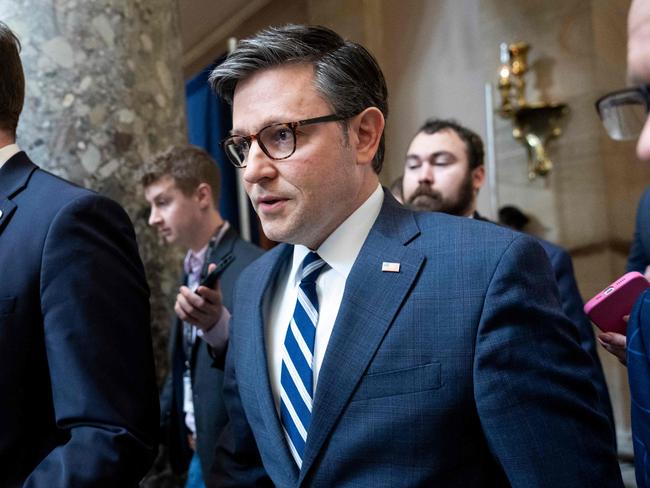
At the White House, Mr Biden said that helping US allies - and particularly coming to the aid of Ukraine as it struggles to fend off a two-year Russian invasion - is a fundamental responsibility.
“History is watching,” said Mr Biden, repeating the phrase five times in televised remarks. “Supporting this bill is standing up to Putin. Opposing it is playing into Putin’s hands,” the Democrat added.
Mr Biden also lashed out at Mr Trump after the former one-term president encouraged Russia to attack NATO members who failed to meet financial commitments.
“For God’s sake, it’s dumb. It’s shameful. It’s dangerous. It’s un-American,” Mr Biden said, saying that the twice-impeached Mr Trump viewed the Western military alliance as a “protection racket.”
“No other president in our history has ever bowed down to a Russian dictator.”
UKRAINE DEATH TOLL RISES
Russian strikes killed five people across Ukraine on Tuesday, Ukrainian officials said, as the second anniversary of Moscow’s invasion approaches.
Officials said civilians were killed in the northeast, south and central parts of the country.
Moscow-installed occupational authorities in eastern Ukraine, meanwhile, said Ukrainian shelling killed three people on Tuesday.
The head of the northeastern Kharkiv region, Oleg Synegubov, said three people were killed in his region, which borders Russia and has seen increased attacks in recent months.
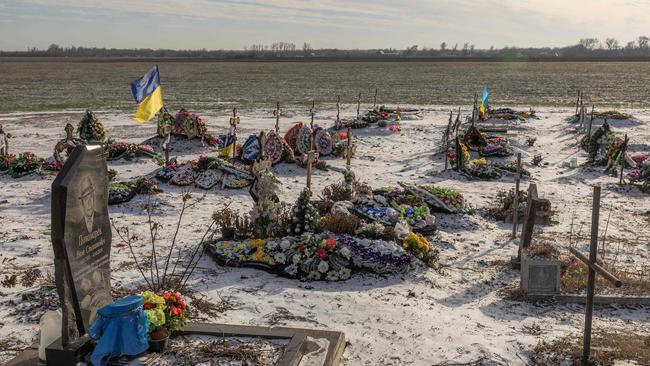
Synegubov said a 61-year-old woman was killed when Russian forces shelled the city of Vovchansk that lies seven kilometres from the Russian border.
“At the time of the shelling, people were at the local market,” Synegubov said. The official said “two civilian men” were also killed earlier in the morning when Russia shelled an “agricultural enterprise” in the village of Kurylivka, near the city of Kupiansk.
Moscow’s forces have for months attacked Kupiansk, which fell to Russia in the first days of its invasion in 2022 but was retaken by Ukraine later that same year.
US ELECTION CYCLE COULD HAND PUTIN VICTORY
While Russian President Vladimir Putin failed in his initial aim of taking key Ukrainian cities in a lightning offensive in the first year of his war on Ukraine, he now appears increasingly confident of his strategy and its outcome, according to experts.
“It’s true to say that President Putin is confident that he can outlast the West and so it’s incumbent on us to show the resolve to prove him wrong,” said a senior official from a Western country, asking not to be named, according to AFP.
Putin has made increasingly bullish statements, declaring that Ukraine “does not have a future,” and in an interview broadcast last week with right-wing US talk show host Tucker Carlson – that a strategic defeat of Russia is “impossible by definition”.
Analysts say only drastically ramped up Western support for Ukraine as it runs out of munitions can change the momentum.
But even this is far from certain, as US legislators hesitate over a new aid package, Putin awaits a possible Donald Trump victory in this year’s US presidential election and cracks emerge in Europe.
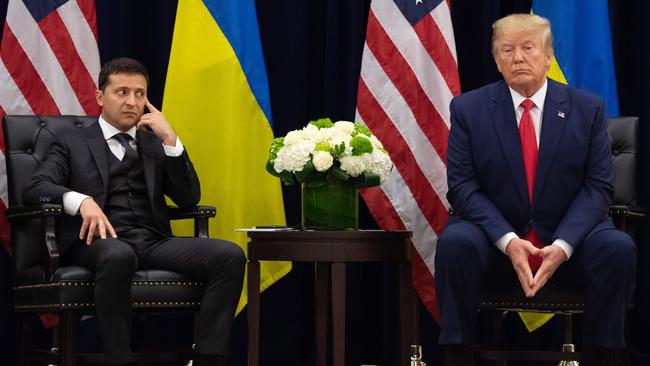
“It is a race by both sides to rebuild their offensive capacity,” said Andrea Kendall-Taylor, senior fellow at Washington-based Centre for New American Security.
“If the Western funding does not come through, if Russia gains some sort of advantage, then they have the possibility of making some more gains,” she said.
“From Putin’s perspective, 2024 is quite critical,” she said. Ukraine is deeply unsettled by the prospect of a return to the White House for Trump, who famously declared in 2023 he would “have that war settled in one day, 24 hours” if elected again.
Far-right parties, which commentators fear would advocate a softer line against Russia, are on the rise in France and Germany.
Tatiana Stanovaya, founder of the R. Politik consultancy, said Putin saw 2024 as a “window of opportunity” to turn the course of the war in Russia’s favour, partly due to the weaknesses in the West.
“He anticipates a temporary gap in Western military support, with ammunition production expected to ramp up only by early 2025,” she wrote on her Telegram channel.
“The US election cycle might lead to a less decisive American geopolitical strategy towards supporting Kyiv, and the European Union, facing its own internal disagreements, is unlikely to compensate for this support on its own,” she added.
UKRAINE-RUSSIA NEGOTIATIONS ‘IMPOSSIBLE’
After two years of war in Ukraine, there is no prospect of negotiations to find a breakthrough as Russian President Vladimir Putin, emboldened by the erosion of Western support for Kyiv, girds for a long conflict.
“I don’t see any negotiations taking place any time soon,” Fyodor Lukyanov, head of the Kremlin-linked Council on Foreign and Defence Policy think tank in Moscow, told AFP.
“There’s nothing they can negotiate about.”
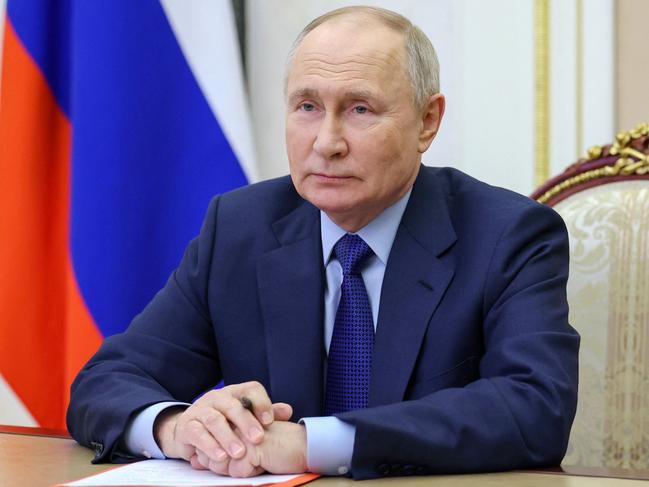
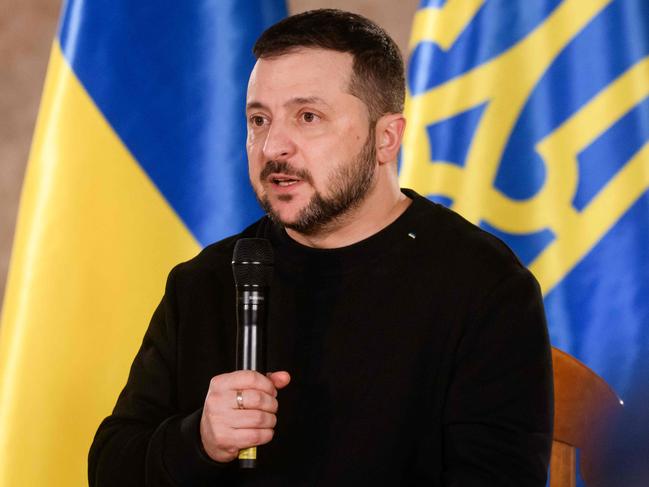
Mykhailo Podoliak, an adviser to Ukrainian President Volodymyr Zelensky, reiterated Kyiv’s long-held position that no negotiations were possible until Russia withdraws from occupied territories.
“In any other case, negotiations are impossible,” Podoliak told AFP. A European diplomat, speaking on condition of anonymity, also ruled out any talks under the current circumstances.
“Negotiations can only take place when Ukraine is in a position of strength on the ground,” said the diplomat.
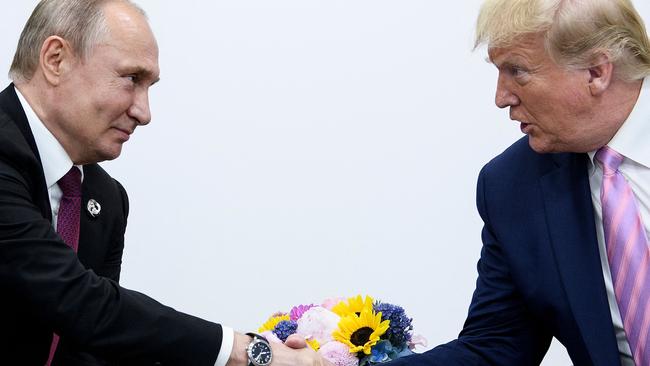
TRUMP’S NATO REMARKS SPARK OUTRAGE
Former US president Donald Trump has threatened to encourage Russia to attack NATO members who are not fully paid up.
Mr Trump warned, in the event he is re-elected as leader of the United States, that he would not defend NATO members who had not met their financial obligations, and would even “encourage” Russia to attack them.
The current Republican US president hopeful has regularly criticised allies of the North Atlantic Treaty Organisation for underfunding the group.
European Council President Charles Michel on Sunday denounced Mr Trump’s comments as “reckless”.
“The Transatlantic Alliance has underpinned the security and the prosperity of Americans, Canadians and Europeans for 75 years,” said Michel on X, formerly Twitter.
“Reckless statements on #NATO’s security and (Article) 5 solidarity serve only Putin’s interest” and “they do not bring more security or peace to the world”, he added.
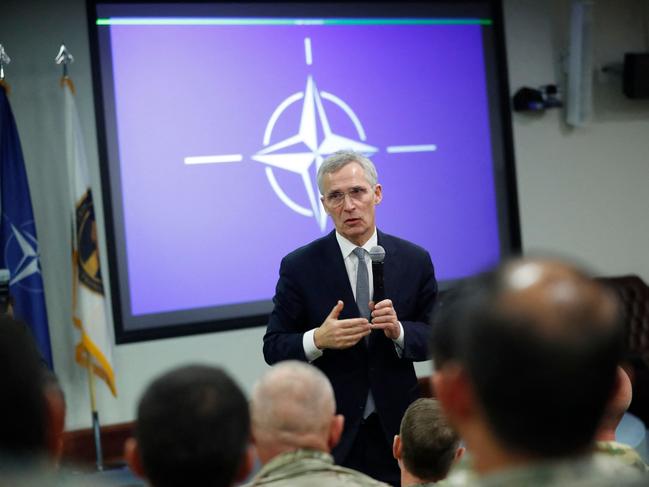
Article 5 stipulates that if a NATO country is victim of an armed attack, each member of the Alliance must consider the act as an attack against the whole group and take measures to provide aid to the country under threat.
NATO chief Jens Stoltenberg on Sunday warned against talk that “undermines security” and “puts American and European soldiers at increased risk”.
“Any suggestion that allies will not defend each other undermines all of our security, including that of the US,” Mr Stoltenberg said in a statement.
Mr Trump, likely the Republican candidate to face Democrat President Joe Biden in November’s US election, made his statement about NATO after having put pressure on Republicans in Congress to block a bill to provide new aid to Ukraine.
The White House reacted sharply to Mr Trump’s remarks. “Encouraging invasions of our closest allies by murderous regimes is appalling and unhinged,” White House spokesman Andrew Bates said.
EUROPEAN COUNTRIES FIGHT RUSSIAN DISINFORMATION ATTACKS
The top diplomats of France, Germany and Poland will launch a joint initiative to fight Russian disinformation attacks.
French Foreign Minister Stephane Sejourne will host German counterpart Annalena Baerbock and Radoslaw Sikorski of Poland at the Chateau de La Celle-Saint-Cloud just outside Paris.
Sejourne said weekend that France, Germany and Poland would unveil a new co-operation agreement to combat foreign disinformation operations, particularly those originating in Russia.
“Our three countries have been victims of the same destabilisation strategy,” Sejourne said.
Sejourne said that the trio would reveal “the attacks that have been committed,” adding such disinformation attacks were designed to divide public opinion.
Kremlin critics say Russia has for years used troll factories and fake news websites to spread disinformation in the West.
After Russian leader Vladimir Putin sent troops to Ukraine in February 2022, Moscow ramped up efforts to promote a pro-Kremlin narrative.
Paris, Berlin and Warsaw are hoping to ramp up co-operation and reinvigorate the so-called “Weimar Triangle” format initially created in 1991 to enable concerted European action.
PUTIN SIGNALS HOPE FOR JAILED JOURNALIST
Russian President Putin has raised the possibility that detained Wall Street Journal reporter Evan Gershkovich could be returned to the US, but reiterated disputed claims the reporter was a spy in an interview with broadcaster Tucker Carlson.
Mr Putin said talks were already underway to return Mr Gershkovich to the US, saying “it does not make any sense to keep him in prison in Russia”, but asserted he was “working for the US special services”.
The 32-year-old reporter has been detained in Russia on espionage charges since March 2023, in an action condemned by the US government, Mr Gershkovich’s company News Corp (publisher of this masthead) and advocates of press freedom worldwide. He has denied the charges against him.
Mr Putin said he “did not rule out” that Mr Gershkovich “may return to his motherland” but stressed the negotiations were not a public matter.
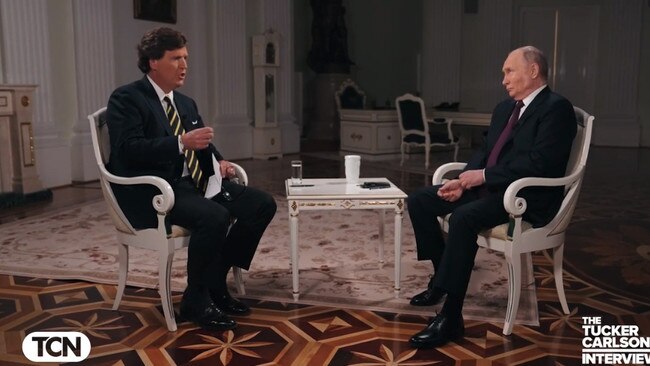
“The more public we render things of this nature, the more difficult it becomes to resolve them. Everything has to be done in calm manner,” he said.
“There have been many successful examples of these talks crowned with success. Probably this is going to be crowned with success as well. But we have to come to an agreement.”
The news about Mr Gershkovich was one of the few concessions Mr Putin made in the face-to-face interview with Carlson.
“We have done so many gestures of goodwill, out of decency that I think we have run out of them,” Mr Putin said.
Despite persistent rumours of illness in recent months, Mr Putin looked healthy in the two-hour interview, and has clearly lost none of his boldness.
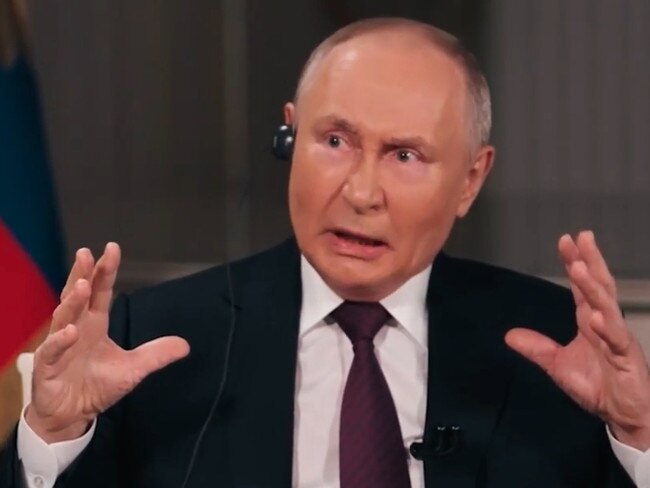
In the wide-ranging and sometimes pugnacious two-hour discussion, Mr Putin downplayed the prospect of peace talks over Ukraine, accused the US of interfering in Kyiv politics, claimed he had no territorial claims on Europe and offered an extensive history of the region by way of defending Russia’s 2022 invasion.
Carlson did not ask Mr Putin about the downing of MH17, accusations of Russian interference in US elections, the poisoning of Russian agents in the UK in 2018 or the suppression of political opposition within Russia, but did ask the leader about the destruction of the Nord Stream Gas pipeline in 2022, the rise of China and his thoughts about several world figures.
Donald Trump barely rated a mention – Mr Putin simply said he had a “personal relationship” with him while he was US president – but the Russian leader lavished praise on Tesla CEO Elon Musk.
“There’s no stopping Elon Musk. He will do as he sees fit. I think he’s a smart person. I truly believe he is,” he said.
When asked who blew up the Nord Stream Gas pipeline in 2022, Mr Putin joked at first, saying “You for sure,” (meaning Carlson) before suggesting the CIA might have done it.
Ep. 73 The Vladimir Putin Interview pic.twitter.com/67YuZRkfLL
— Tucker Carlson (@TuckerCarlson) February 8, 2024
He also surprised Carlson at one point by saying the CIA was “the organisation you wanted to join back in the day, as I understand”.
“We should thank God they didn’t let you in,” Mr Putin added.
The Wikipedia page on Tucker Carlson states that the news anchor applied to join the CIA after college, but was rejected, after which he pursued his career in journalism.
Regarding the conflict in Ukraine, Mr Putin seemed dismissive of the prospect of peace talks, saying Ukraine had legislated a ban on negotiating with Russia, making a dialogue impossible.
Asked by Carlson when he (Putin) last spoke with US President Joe Biden, Mr Putin said he could not remember, and when pressed, he added testily: “Why? Do I have to remember everything? I have my own things to do. We have domestic political affairs.”
Mr Putin also claimed Russia had no claims on any other territories, and that they would invade another country such as Poland only if attacked.
“We have no interest in Poland, Latvia or anywhere else,” he said.
It was “absolutely out of the question,” he said.
But later in the interview he suggested there could be some scope for a resolution over Ukraine, saying “sooner or later it will result in an agreement:”.
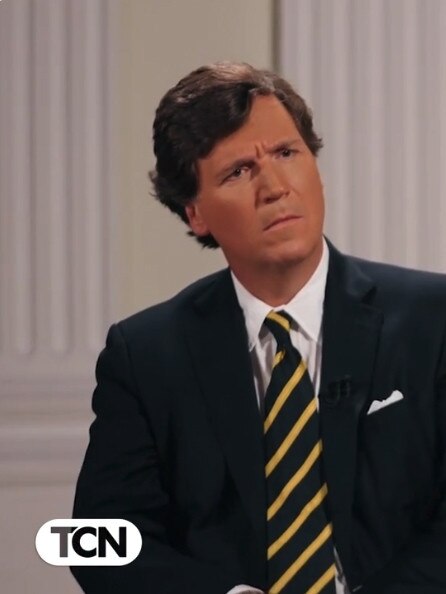
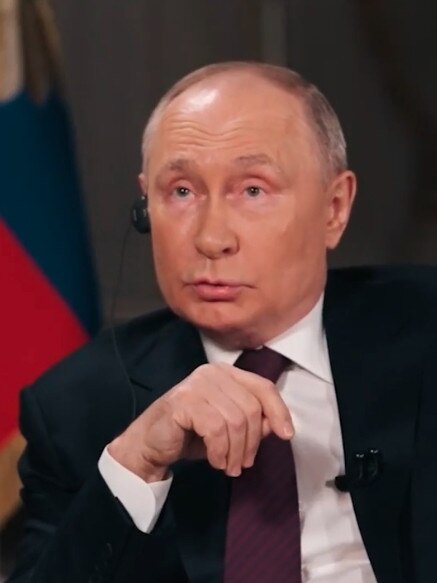
He defended the 2022 invasion on the disputed claim that Nazism remains a popular movement there, with those who exterminated Jews for Hitler “made into national heroes”. While mentioning him by name only once during the interview, Putin accused Ukraininan President Volodymyr Zelensky of applauding a known Nazi during a recent trip to Canada.
“I say that the Ukrainians are part of the one Russian people. They say, no, we are a separate people. Okay, fine. If they consider themselves a separate people, they have the right to do so. But not on the basis of Nazism, the Nazi ideology,” he said.
Asked by Carlson if he launched the attack on Ukraine because of a fear the US would strike Russia, Mr Putin responded: “Are we having a talk show or a serious conversation?”
The Russian leader then said he would take “30 seconds or one minute” to provide “a little historical background” – before launching into a complex history of the region, starting with the establishment of modern Russia in the year 862, with “two centres of power – Kyiv (Kyiv) and Novgorod”.
This was a “single territory” with “integrated economic ties” and “one and the same language,” he said.
The history lesson continued with references to Genghis Khan and the Grand Duchy of Lithuania, along with a claim that the word ‘Ukrainian’ originally meant a person “who was living on the outskirts of the state, along the fringes … it didn’t mean any particular ethnic group”. A distinct Ukrainian identity was an idea promulgated by the “Austrian General Staff,” shortly before World War One, Mr Putin claimed.
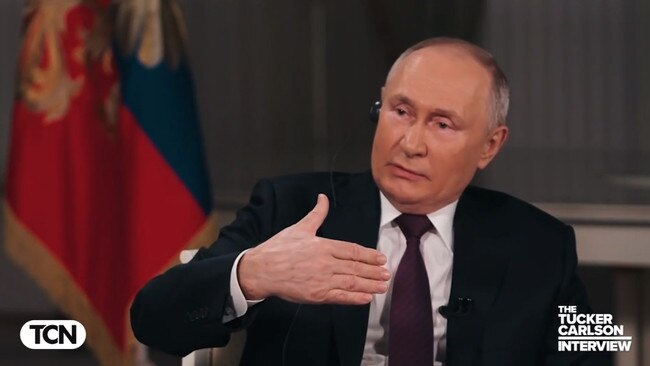
In an apparent digression, Mr Putin also gave a confusing account about the causes of World War II, accusing Poland of both “collaborating” with Hitler, but also being “uncompromising”, meaning “Hitler had nothing to do but start implement his plans with Poland”.
The history lesson continued with references to other parts of land that were incorporated into Ukraine before and after World War Two, including from Hungary, all of which Mr Putin seemed to suggest was illegitimate.
“We have every reason to affirm that Ukraine is an artificial state that was shaped at Stalin’s will,” he said.
Referring to the parts of land that were transferred from Hungary to Ukraine, Carlson then asked Mr Putin if he had “told” Hungarian President Viktor Orban “That he can have part of Ukraine?”
“Never. I have never told him. Not a single time. But I actually know for sure that Hungarians who live there wanted to get back to their historical land,” Mr Putin replied, adding that he had seen evidence of Hungarian language and culture in Ukraine when he visited there in the 1980s.
Mr Putin then went on to claim that Ukraine had benefited from the dissolution of the former Soviet Union in 1991, saying “everything that Russia had generously bestowed on Ukraine was dragged away by the latter”.
The breakdown of the former Soviet Union appears to still rankle with the Russian leader; later in the interview he said in 1991 Russia “expected that it would be welcomed into the brotherly family of civilised nations,” but “nothing like this happened.”
“You tricked us,” Mr Putin said. “I don’t mean you personally when I say you. Of course I’m talking about the United States.”
“The promise was that NATO would not expand eastwards. But it happened five times,” he said. “There were five waves of expansion. We tolerated all that. We were trying to persuade them. We were saying, please don’t. We are as bourgeois now as you are.”
In an unexpected revelation, Mr Putin then revealed he had asked then US president Bill Clinton if Russia asked to join NATO, what the reaction would be. Putin claimed Clinton initially said “I think so,” before later, after talking with his advisers, saying “It’s not possible now”.
“If he had said yes, the process of rapprochement would have commenced, and eventually it might have happened if we had seen some sincere wish on the side of our partners. But it didn’t happen,” Mr Putin said.
Continuing with his longwinded answers, Mr Putin then claimed that his offer of co-operation with the west over missile defences was rebuffed, and signs from NATO in 2008 that Ukraine would be accepted into the treaty was “not how we agreed”.
The offer of co-operation over defence was witnessed by then US Secretary of State Condoleezza Rice, Microsoft founder Bill Gates and current CIA director William Burns, he revealed later in the interview.
He also accused the US – through the CIA – of interfering in Ukrainian politics, starting with the presidential elections in 2004, when the western friendly Viktor Yushchenko came to power.
Mr Putin also seemed to suggest US aggression led to Russian’s annexation of the Crimea in 2014, saying there was video of aircraft “attacking [the Crimean city of] Donetsk from above”.
“The US political leadership pushed us to the line we could not cross because doing so could have ruined Russia itself. Besides, we could not leave our brothers in faith,” he said.
– with AFP




